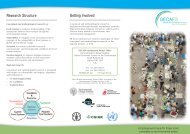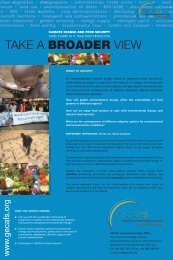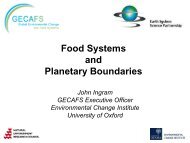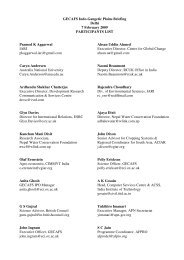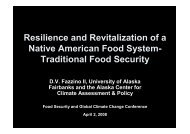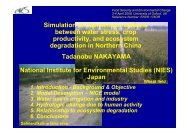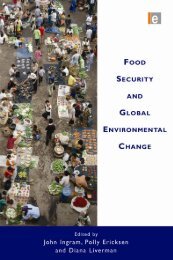UNDP 2006. The 2006 Human Development Report - Beyond Scarcity: Power, Poverty and the<strong>Global</strong> Water Crisis. United Nations Development Programme.UNEP 2002. <strong>Global</strong> Environment Outlook 3: Past, present and future perspectives. United NationsEnvironment Programme.UNEP 2007. <strong>Global</strong> Environment Outlook 4: Environment for Development.USAID. 2001. <strong>Food</strong> <strong>Security</strong> [Online]. Available:http://www.usaid.gov/our_work/agriculture/food_security.htm.USDA-ERS. 2009. <strong>Food</strong> <strong>Security</strong> in the United States: Measuring Household <strong>Food</strong> <strong>Security</strong> [Online].Available: http://www.ers.usda.gov/Briefing/<strong>Food</strong><strong>Security</strong>/measurement.htm#how [Accessed22 June 2012.USDA-FAS 2010. Grain: World Markets and Trade.VAN ITTERSUM, M. K., LEFFELAAR, P. A., VAN KEULEN, H., KROPFF, M. J., BASTIAANS,L. & GOUDRIAAN, J. 2003. On approaches and applications of the Wageningen cropmodels. European Journal of Agronomy, 18, 201-234.VAN ITTERSUM, M. K. & RABBINGE, R. 1997. Concepts in production ecology for analysis andquantification of agricultural input-output combinations. Field Crops Research, 52, 197-208.VAN TULDER, R. & VAN DER ZWART, A. 2006. International business-society management:linking corporate responsibility and globalization, New York, Routledge.VARADY, R. G. & ILES-SHIH, M. 2009. <strong>Global</strong> Water Initiatives: What Do the Experts Think? In:BISWAS, A. K. & TORTAJADA, C. (eds.) Impacts of Megaconferences on the WaterSec<strong>to</strong>r. Springer Berlin Heidelberg.VELDKAMP, A., KOK, K., DE KONING, G. H. J., SCHOORL, J. M., SONNEVELD, M. P. W. &VERBURG, P. H. 2001. Multi-scale system approaches in agronomic research at thelandscape level. Soil and Tillage Research, 58, 129-140.VITOUSEK, P. M., MOONEY, H. A., LUBCHENCO, J. & MELILLO, J., M. 1997. HumanDomination of Earth's Ecosystems Science 277, 494 - 499.WFP. 2009. Informal Cross Border <strong>Food</strong> Trade in Southern Africa. FEWSNET [Online], 53.Available:http://www.fews.net/docs/Publications/Informal%20Cross%20Border%20<strong>Food</strong>%20Trade%20Bulletin-Jul_Aug%2009.pdf.WISCONSIN WIC PROGRAM 2007. <strong>Food</strong> <strong>Security</strong> in the Wisconsin WIC Population. WisconsinDepartment of Health and Family Services.WOLF, A. T., YOFFE, S. B. & GIORDANO, M. 2003. International waters: identifying basins atrisk. Water Policy, 5, 29-60.WOOD, S., ERICKSEN, P., STEWART, B., THORNTON, P. & ANDERSON, M. 2010. LessonsLearned from International Assessments. In: INGRAM, J., ERICKSEN, P. & LIVERMAN,D. (eds.) <strong>Food</strong> <strong>Security</strong> and <strong>Global</strong> <strong>Environmental</strong> Change. London: Earthscan.WORLD BANK 2011. <strong>Food</strong> Price Watch April 2011. Poverty Reduction and Equity Group, PovertyReduction and Economic Management (PREM) Network.ZUREK, M. & HENRICHS, T. 2007. Linking scenarios across geographical scales in internationalenvironmental assessments. Technological Forecasting and Social Change, 74, 1282-1295.138
SummaryBackground<strong>Food</strong> is a fundamental human need and achieving food security is of paramount importance<strong>to</strong> society at large. Driven by the requirement <strong>to</strong> feed ever increasing human demand, majorscientific and technical advances have been made in the production of food. However, despitetremendous success in maintaining food production ahead of per capita need on a globalbasis, his<strong>to</strong>ry shows that increasing production alone does not satisfy food security for all: in2010 about one billion people were food-insecure. <strong>Production</strong> alone is manifestly not the onlyfac<strong>to</strong>r.<strong>Food</strong> security is a state or condition. While earlier definitions of food security stressed foodproduction, a commonly-used definition stemming from the 1996 World <strong>Food</strong> Summit statesthat food security is met when “all people, at all times, have physical and economic access <strong>to</strong>sufficient, safe, and nutritious food <strong>to</strong> meet their dietary needs and food preferences for anactive and healthy life”. The emphasis changed from increasing food production <strong>to</strong> increasingaccess <strong>to</strong> food for all.<strong>Food</strong> security concerns have recently rapidly ascended policy, societal and science agendasdriven the growing realisation of the scale of future requirements: 50% more food will beneeded by 2030, and possibly 100% more meat by 2050. While a large proportion of thediscussion under the food security banner continues <strong>to</strong> address issues related <strong>to</strong> foodproduction, when addressing food security it is crucial <strong>to</strong> take a broad view, including – butnot being limited <strong>to</strong> – the fundamentally-important part that producing food plays; the impac<strong>to</strong>f the 2007-08 food price spike underscored the concept of economic access <strong>to</strong> food beingcritically important, rather than food supply per se. Meanwhile, it is now clear that climatechange will affect crop growth in many parts of the world, with the most deleterious impactsanticipated in the developing regions. New concepts, <strong>to</strong>ols and approaches are clearly needed<strong>to</strong> address the broader food security agenda. Their development is all the more urgent giventhe additional complications that global environmental change (GEC, including climatechange) is already bringing <strong>to</strong> the many for whom food security is already far from easy.Addressing the complex nature of food security requires greatly enhanced interdisciplinarity,with social science, economics and the humanities all playing critical roles in addition <strong>to</strong> thebiophysical sciences.The late 1990’s saw the emergence of an international GEC research project (<strong>Global</strong><strong>Environmental</strong> Change and <strong>Food</strong> Systems, GECAFS, 2001-2011). The goal of GECAFS was“<strong>to</strong> determine strategies <strong>to</strong> cope with the impacts of global environmental change on foodsystems and <strong>to</strong> assess the environmental and socioeconomic consequences of adaptiveresponses aimed at improving food security”. GECAFS planning recognised that research <strong>to</strong>address this challenging goal needed <strong>to</strong> be set within the context of food systems, rather thanjust agricultural systems. This helped <strong>to</strong> identify and integrate the links between a number of139
- Page 1 and 2:
From Food Production to Food Securi
- Page 3 and 4:
From Food Production to Food Securi
- Page 5 and 6:
Table of ContentsAbstract .........
- Page 7 and 8:
Paper 6: Undertaking Research at th
- Page 9:
AbstractFood security is a conditio
- Page 12 and 13:
2010 about 925 million people had t
- Page 14 and 15:
water) are used, and reduce negativ
- Page 16 and 17:
While the flow of the argument abou
- Page 18 and 19:
determine interactions along and be
- Page 20 and 21:
Paper 3: A Food Systems Approach to
- Page 23:
From Food Production to Food Securi
- Page 26 and 27:
concerns and are now issues that mu
- Page 28 and 29:
the relationships between GEC and f
- Page 30 and 31:
Theme 2 aims to understand how comm
- Page 32 and 33:
GEC and the Food System of the Indo
- Page 34 and 35:
Paper 2: The role of agronomic rese
- Page 36 and 37:
These advances have resulted from a
- Page 38 and 39:
Crop selection to determine mechani
- Page 40 and 41:
Agronomic science is central to imp
- Page 42 and 43:
Agronomic research in relation to f
- Page 44 and 45:
The discussion above identifies a n
- Page 46 and 47:
interventions and political inertia
- Page 48 and 49:
While research on producing food ha
- Page 50 and 51:
Box 1 Food system Activities and fo
- Page 52 and 53:
In addition to broadening the debat
- Page 54 and 55:
options. Examples already seen rang
- Page 56 and 57:
Figure 3 Outcomes for 10 variables
- Page 58 and 59:
Figure 4 Nine ‘planetary boundari
- Page 60 and 61:
Figure 5 Environmental change, food
- Page 62 and 63:
Table 1: Indicative analysis of the
- Page 65:
From Food Production to Food Securi
- Page 68 and 69:
Trade Agreement (NAFTA) and the Eur
- Page 70 and 71:
Parry et al., 2005). Conducting foo
- Page 72 and 73:
is provided in the ESF/COST Forward
- Page 74 and 75:
Paper 5: Engaging Stakeholders at t
- Page 76 and 77:
into actions (strategies, policies,
- Page 78 and 79:
Box 2 Engaging with stakeholders in
- Page 80 and 81:
Box 3 Setting the research agenda f
- Page 82 and 83:
Third, and of considerable practica
- Page 84 and 85:
Figure 2: Organizing and understand
- Page 86 and 87:
organizations made up of numerous n
- Page 88 and 89:
Elements of good practice in stakeh
- Page 90 and 91:
Finally, it is worth noting that fo
- Page 92 and 93:
development (Lee, 1999; Gunderson a
- Page 94 and 95:
Box 7 The GECAFS stakeholder survey
- Page 96 and 97:
‘break down’ what might be a hi
- Page 98 and 99: Paper 6: Undertaking Research at th
- Page 100 and 101: agriculture in many parts of the wo
- Page 102 and 103: gaps. The presence of a strong tech
- Page 104 and 105: an average of two years to coalesce
- Page 106 and 107: Institute for Meteorology and Hydro
- Page 108 and 109: Identifying case study sitesResearc
- Page 110 and 111: can both benefit from and contribut
- Page 112 and 113: Box 5 Mapping stakeholder interests
- Page 114 and 115: Holding planning meetings in locati
- Page 116 and 117: This reorientation of the debate fr
- Page 118 and 119: Importance of this type of research
- Page 120 and 121: Integrating the food system concept
- Page 122 and 123: awareness of the GEC issues within
- Page 124 and 125: pollutants were then introduced as
- Page 126 and 127: communities operating in food syste
- Page 128 and 129: Improving input-use efficiency acro
- Page 130 and 131: governance focuses on the range of
- Page 132 and 133: Developing research agendas in supp
- Page 134 and 135: The renewed approach to interdiscip
- Page 136 and 137: BIELAK, A., HOLMES, J., SAVGÅRD, J
- Page 138 and 139: EAKIN, H. 2010. What is Vulnerable?
- Page 140 and 141: GODFRAY, H. C. J., BEDDINGTON, J. R
- Page 142 and 143: INGRAM, J. S. I. & FERNANDES, E. C.
- Page 144 and 145: LYUTSE, S. 2010. The One Billion To
- Page 146 and 147: RAYNER, S. & MALONE, E. L. 1998. Hu
- Page 150 and 151: activities “from plough to plate
- Page 152 and 153: contribution to the science agenda:
- Page 154 and 155: urgently needed, and - given the gr
- Page 156 and 157: GECAFS plannenmakerij stelde vast d
- Page 158 and 159: ieder hun eigen groep van betrokken
- Page 160 and 161: het gebied van beheer hebben betrek
- Page 162: Curriculum VitaeFollowing a BSc in



